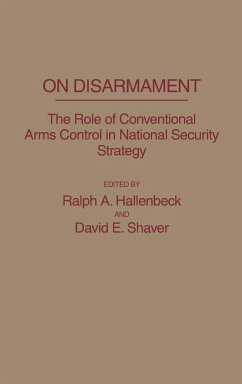
Stepping Back
Nuclear Arms Control and the End of the Cold War
Versandkostenfrei!
Versandfertig in 1-2 Wochen
71,99 €
inkl. MwSt.

PAYBACK Punkte
36 °P sammeln!
Vogele provides a contemporary history of the nuclear arms control negotiations of the 1980s, tracing these negotiations from their initiation at the beginning of the decade through the agreements that were reached by the end. Two chapters provide background on arms control efforts from the mid-1950s through 1980. The work is an analytical history of nuclear arms control bargaining processes, and an evaluation of the utility of alternative negotiation strategies for producing agreement. Thus, the history of these negotiations offers lessons for the continuing pursuit of arms control and other ...
Vogele provides a contemporary history of the nuclear arms control negotiations of the 1980s, tracing these negotiations from their initiation at the beginning of the decade through the agreements that were reached by the end. Two chapters provide background on arms control efforts from the mid-1950s through 1980. The work is an analytical history of nuclear arms control bargaining processes, and an evaluation of the utility of alternative negotiation strategies for producing agreement. Thus, the history of these negotiations offers lessons for the continuing pursuit of arms control and other cooperative security arrangement in the post-Cold War international order.














